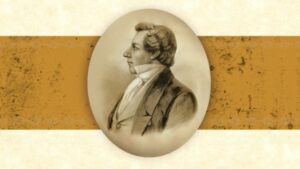This is an excerpt of the book, Of these Emblems — Coming Closer to Christ through the Sacrament. Purchase the book by clicking here
Sometimes a sacrament meeting speaker will say something that lingers in your mind for years to come. That happened to me when a speaker was giving a talk about the importance of the sacrament. He told about a man who came into a meeting and sat on the pew beside him; he didn’t recognize the man and found out later he was not a member of the Church. The man was attentive and reverent.
When the sacrament bread was passed the man took a piece and said in a barely audible voice, “Thank you, Jesus.” When the water was passed, he drank and again said, “Thank you, Jesus.” The speaker told how touched he was by this man’s gratitude to the Savior for what He had done for him.
Now whenever I partake of the sacrament I often find myself thinking the words, “Thank you, Jesus.”
Expressing gratitude in our hearts for what the Savior has done for us is significantly important; however, that is just one part of the sacrament experience for Latter-day Saints. Elder Joseph Anderson explained, “When we enter into the waters of baptism we enter into covenant with the Lord that we will keep the commandments that He has given us. When we partake of the sacrament we renew that covenant; we partake of these emblems in remembrance of the atoning sacrifice of our Lord and Savior; we express a willingness to take upon us His name, the name of our Lord and Master, our Savior, Jesus Christ; and we covenant that we will always remember Him, that we will keep the commandments which He has given us” (“We Are a Covenant-making People,” Ensign, Nov. 1976, 89).
In speaking about the sacrament, Elder Jeffrey R. Holland reminded us that we as a people need to take the sacrament much more seriously than we often do — and that the sacrament is the real purpose of sacrament meeting, not something to rush through so we can get on with the rest of the meeting. He also counseled that everything in the meeting, all that is spoken or sung, should be in harmony with that sacred ordinance (see “‘This Do in Remembrance of Me,’” Ensign, Nov. 1995, 67).
Learning to Be Filled
I remember sacrament meetings years ago when our five children were small. It was a challenge to stay focused and to feel the Spirit as they wriggled and poked each other, too-loudly asking, “When will the snackerment come?” Some Sundays I felt sufficiently righteous just getting them ready enough to show up. For several of those years I was the taskmaster while my bishopric husband sat on the stand, smiling encouragement from afar. Now I see young mothers and fathers doing the same thing — trying their best. I have learned that “their best” — or close to it — is good enough for those challenging years.
How glad I am that we didn’t let the difficulty of it keep us away. There were moments scattered here and there throughout those years that made it all worthwhile.
Those children understand it now as they experience the same with their little ones. And I’ve also discovered that finding the sacrament to be an anticipated delicious “snack” isn’t too far off base. Gradually the deliciousness takes on new meaning, with feelings of joy and renewal.
We can experience this joy of having His Spirit with us in a variety of ways. In sharing her sacrament experience, a friend told me, “One Sunday as the priests tore the bread I pondered Why do they tear the bread? At that moment the hymn rang out in my mind — ‘bruised, broken, torn for us’ — and a picture came to me of Jesus with His arms outstretched, the spikes being driven through His hands and His flesh tearing. At that moment the Spirit enveloped me, and I knew of His love for me.
The Power of Sacrament Hymns
As these stories have testified, there is something deeply touching about the sacrament hymns. Singing them and hearing the congregation sing them always helps me prepare my mind and heart for the sacrament. They are like an official invitation that opens the door for the Spirit — even for angels — to attend the meeting and bring comfort to our souls. Many times I have felt the Spirit so powerfully during the singing that my tears can’t be restrained. We all come seeking His forgiveness and the sweet assurance that He is with us and will help us with our trials. Sacrament hymns help that happen for me.
The following account gives a glimpse into the feelings of those who suffer from sin so serious that they are denied the opportunity of partaking of the sacrament.
A member wrote the following experience of the blessing of a sacrament hymn during his time of repentance:
“Nearly a decade ago I went to my bishop and confessed some terrible sins that would lead to my excommunication several weeks later. As I sat in sacrament meeting the next week, and we sang the sacrament hymn, ‘Gently Raise the Sacred Strain’ (Hymns, No. 146), the words of the fourth verse struck home with me:
Holy, holy is the Lord.
Precious, precious is his word:
Repent and live,
Repent and live;
Tho your sins be crimson red,
Oh, repent, and he’ll forgive.
Oh, repent, and he’ll forgive.
I am a seventh-generation member of the Church and have sung or heard this hymn my entire life, but never did it have the impact that it did at that time. Tears flowed as I thought of the ordeal ahead, of the sweet feelings of release and forgiveness that I might feel later on, and of the Savior’s love for me.
Fourteen months later, I was rebaptized, and am again able to partake of the life-giving sacrament. The words ‘Oh repent, and he’ll forgive’ are in my mind and heart each time I partake of the bread and water, and I feel His grace in my life.”
Being Worthy to Partake
Some may wonder at times if they are worthy to take the sacrament, even though they are eligible. Elder John H. Groberg clarified this when he said, “If we desire to improve (which is to repent) and are not under priesthood restriction, then, in my opinion, we are worthy. If, however, we have no desire to improve, if we have no intention of following the guidance of the Spirit, we must ask: Are we worthy to partake, or are we making a mockery of the very purpose of the sacrament, which is to act as a catalyst for personal repentance and improvement? If we remember the Savior and all he has done and will do for us, we will improve our actions and thus come closer to him, which keeps us on the road to eternal life” (“The Beauty and Importance of the Sacrament,” Ensign, May 1989, 38).
I think Satan would like us to believe we’re not worthy. Maybe we’ve lost patience with a child and behaved in ways we aren’t proud of, or had a less than admirable experience with a neighbor, or any one of other numerous shortcomings.
Satan would want us to magnify those experiences out of proportion and make ourselves feel unworthy. He knows the blessing that partaking of the sacrament can be in our lives, and he doesn’t want that for us.
On the other hand, that’s exactly what the Lord wants. He wants to bless us. His whole purpose is to bring us peace, joy, and hope. It then becomes our duty and blessing to put our minds in order, desire to improve, plead for forgiveness, and savor the sweet partaking of these sacred emblems.
Extraordinary Moments
Most often our experiences during the sacrament service are simple and quite ordinary. We often attend meetings and don’t experience anything at all extraordinary, but we still attend. Then one day, as if out of the blue, something extraordinary happens. We have an unexpected deeply spiritual experience, one that never would have happened had regular attendance not put us in the place where the extraordinary could happen.
My friend Jana Parkin shared a tender and extraordinary sacrament experience on her blog:
“Our sixteen-year-old son blessed the sacrament for the first time today. Just a few minutes earlier, a young couple gave their newborn daughter a name and a blessing. Suddenly I was reminded of a day, more than seven years ago, that was poignant and pivotal for me. I hadn’t thought about this experience for literally years. But somehow the sweetness of seeing our son up there blessing the sacrament, willingly and worthily, along with the sweetness and joy of this couple presenting their baby girl both to the ward and the Lord, culminated in a rich flashback experience that I felt compelled to write.
Seven and a half years ago we had a baby that was stillborn. The following Sunday I was well enough to go to church, but wasn’t sure I was ready to greet the throngs of people there, didn’t want them fussing over me and talking about the stillbirth, no matter how much I loved them all. Yet I felt this almost desperate longing to go to church and take the sacrament. So a friend helped me look up the meeting times for a ward in another area, and away I went, all by myself. I just wanted to be invisible, anonymous. I was hoping to slip in unnoticed, get lost in the sea of faces, and worship.
It wasn’t a fast Sunday, but for some reason right between the opening announcements and the sacrament a young father stood up to bless his newborn baby. There it was, the very thing I was trying to escape, staring me right in the face. The depth of my sadness, coupled with the shock of seeing that baby being blessed, was so intense it felt like someone stabbed me right through the heart with a knife. I felt actual physical pain.
But then came the sacrament. As I pondered the Savior and sought His peace, the most amazing feeling swept over me. It was almost like ‘here could be nothing so exquisite and so bitter as were my pains. Yet, there can be nothing so exquisite and sweet as was my joy.’
Comfort. Healing. Peace. Not only was my pain swept away; I felt enveloped in love.
I don’t remember ever feeling as grateful for the sacrament as I did at that moment. I wish I could have that poignant and powerful an experience every week. But I know the sacrament is the most important part of our Sunday worship. I wept as I saw our son up there blessing the bread and water for the first time. And I’ll always remember that amazing Sunday when I learned that no one goes unnoticed in His eyes.” (“No One Goes Unnoticed In His Eyes,” https://reaching4rubies.blogspot.com/)
We, Too, Can Be Filled
By our consistent attendance and partaking of the sacrament, the Lord will use the way He has provided to heal our hearts and bring peace to our souls. We need to be where He is — where He has commanded us to be each Sunday, participating in “the grandeur of this sacred ordinance.” As we do this, it may be said of us, like the Nephites of old during that first administration of the sacrament, “[they did eat and] … they did drink, and they were filled” (3 Ne. 18:9).
Taken from the book Of These Emblems, Covenant Communications.

















